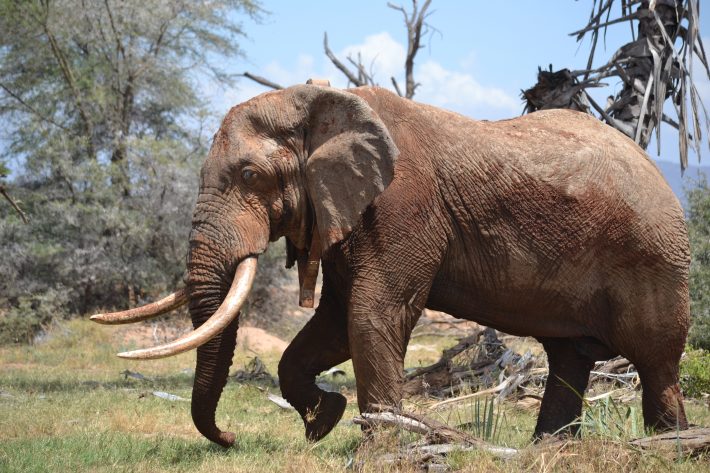The older you get, the harder you seek: the mating secrets of Africa’s bull elephants
Males of many species slow down in their pursuit of females as they age. Not so with elephants. A new study published today reveals that bull elephants increase the energy they put into reproduction as they get older.

The new research conducted by the University of Oxford, Save the Elephants and Colorado State University, compared the movements of male African savannah elephants while they were in musth, a periodic state of intensive testosterone-fueled sexual activity, and when they were not. The results reveal that, as they age, male elephants move more in musth and move less out of musth. The combination of these two diverging factors meant that, despite having similar speeds and range sizes between states at age 20, by age 50 males were traveling twice as fast in 3.5 times larger area in musth compared to non-musth.
The investigation, led by Dr Lucy Taylor as part of her DPhil (PhD) at the University of Oxford, used a combination of visual observations and GPS tracking data from 25 male elephants aged between 20-52 years old. The data was collected in the Samburu and Buffalo Springs National Reserve, Northern Kenya, as part of Save the Elephants’ long-term monitoring project between 2000 and 2018.
Male African savannah elephants continue to increase in body mass throughout their lives, which means that older male elephants often reach twice the size of both females and young males.
Iain Douglas-Hamilton, Founder of Save the Elephants says –
Older bulls are not only larger and more energetic in mating than younger bulls but female elephants tend to prefer them, perhaps because their size demonstrates their survival skills over many years and seasons.
The new results suggest that male elephants are capitalizing on their increase in size by spending more effort searching for females as they get older.
Given that older male elephants tend to be both the target of trophy hunting and poaching, man-made interference could disrupt the age structure, which could bring on musth prematurely and lead to changes in the reproductive dynamics of elephants.Dr Taylor says –
Investigating how elephant reproductive tactics vary with age is crucial to our understanding of the behavioural ecology of the African savannah elephant and, ultimately, the driving forces shaping the evolution of their life history. The fact that mature male elephants make such dramatic changes in their movement patterns when they are in musth also means that we can now use GPS tracking data alone to detect musth.
The ability to detect musth remotely can be used to study male reproductive behaviour in difficult conditions across Africa, and to identify and protect important corridors for genetic transmission between different elephant populations in human-dominated landscapes.
Key findings from the study include:
- Unlike other species, male African elephants increase the energy they put into reproduction as they get older
- Male elephants move faster and further in musth as they age.
- 50-year old males moved 50% faster and twice as far when in musth compared to those of 35 years old. Compared to 20-year olds, who have yet to come into full musth, the 50 year olds move twice as fast and over three times as far.
- Simultaneously, the elephants move less when in non-musth as they get older.
- The change of behaviour as older elephants go into musth is so clear that it can be detected remotely just by using their movement patterns, rather than having to observe the elephants directly.
Read full study (free to read for a limited time):
Taylor, L.A., Vollrath, F., Lambert, B., Lunn, D., Douglas‐Hamilton, I and Wittemyer, G. (2019) Movement reveals reproductive tactics in male elephants. Jounral of Animal Ecology https://besjournals.onlinelibrary.wiley.com/doi/full/10.1111/1365-2656.13035
Media contacts:
Jane Wynyard, Head of Communications, Save The Elephants, +254 (0) 708 669 635
About Save the Elephants (www.savetheelephants.org):
Save the Elephants works to secure a future for elephants in Africa. Specializing in elephant research, STE provides scientific insights into elephant behaviour, intelligence, and long-distance movements and applies them to the challenges of elephant survival. Through our education and outreach programmes, we reach out to hearts and minds and help local people be the custodians of their own rich heritage. Our human-elephant conflict mitigation projects, especially beehive fences, have reduced the number of crop-raiding incidents, and provide farmers with elephant-friendly alternative sources of income. To battle the current surge in ivory poaching, our Elephant Crisis Fund is identifying and supporting the most effective partners in Africa and in the ivory consuming nations to stop poaching, thwart traffickers and end demand for ivory
Like what we stand for?
Support our mission and help develop the next generation of ecologists by donating to the British Ecological Society.